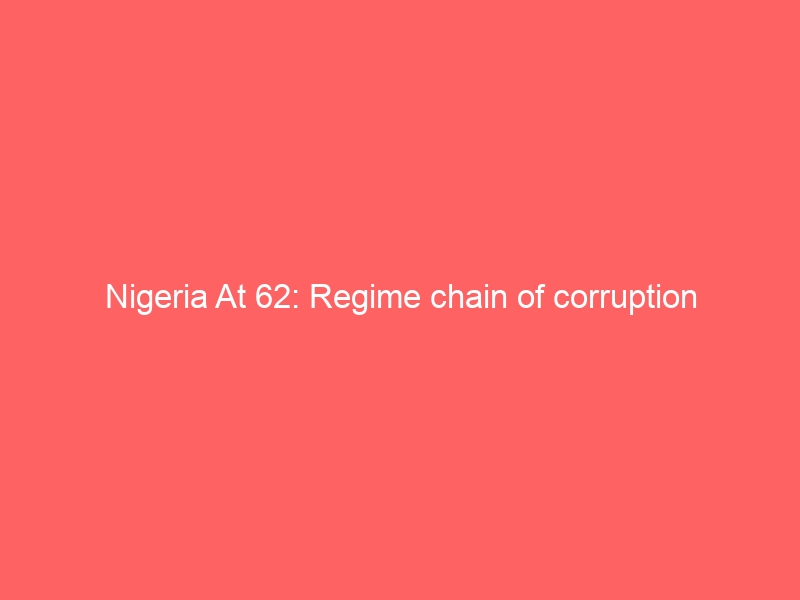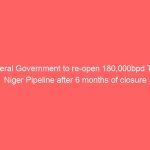Nigeria At 62: Regime chain of corruption
By Jerome-Mario Chijioke Utomi
The word corruption came from the Latin word corruptus, which “means to break or to destroy.” Corruption according to AL-Gore, a former Vice President of the United States (USA), destroys and breaks that trust which is absolutely essential for the delicate alchemy at the heart of representative democracy. In its contemporary form, corruption almost always involves an incestuous coupling of power and money and describes the exchange of money for the misuse of public power.
At independence on October 1, 1960, Feeble attempts made to curb corruption in the country were characterized by more verbal pronouncements without unique architecture or thought process for action. What leaders lacked is the political will to fight corruption.
First, Major Chukuma Kaduna, who led the abortive coup of January 15, 1966, remarked: “the country’s enemies are the political profiteers, swindlers, the men in high and low places that seek bribes and demand 10 per cent, those that seek to keep the country divided permanently so that they can remain in office as ministers or VIPs at least; the tribalists, nepotists, those that make the country look for nothing before international setting, those that corrupted our society and put the national political calendar back to their words and deeds.” No one bothered to investigate this claim.
ALSO READ: Nigeria at 62: A Reflection
Similarly, as the most senior military officer after the Chukwuma Kaduna Nzeogwu aborted coup, in 1966, General Thomas Johnson Umunakwe Aguiyi-Ironsi, the first military Head of State in his resolve to curb corruption among other comments declared that “the military Government will stamp out corruption and dishonesty in our public offices with ruthless efficiency and restore integrity and self-respect in our public affairs.” That statement only existed in the frames as he was later killed on July 29, 1966, by the bloody revenge coup.
Yakubu Gowon who took over from General Thomas Johnson Umunakwe Aguiyi-Ironsi designed five main issues that his administration would handle with the fourth focusing on ending corruption in the country. It however, turned out to be a paradox of the sort as he was later accused of corruption while in office.
On the other hands, what appeared as a departure from the old order came the way of Nigerians in 1975, when Brigadier Muritala Mohammed upon ascending the mantle of leadership, forfeited to the nation the property he acquired with the public funds as well as constituted the Pedro Martins Corrupt Practices Investigation Bureau to among other responsibilities probe Gowon’s administration. Regrettably, this ‘revolution’ came to an abrupt end with his assassination.
After Mohammed’s assassination the following year, the military appointed Obasanjo, who ‘against his will’ took over the mantle of the nation’s leadership as the head of the government. Following the 1979 election, Obasanjo handed over control of Nigeria to the newly elected civilian president, Shehu Shagari.
In my view, the impact of President Shehu Shagari’s fight against corruption was, like others, not seriously felt. Apart from his call on Nigerians to support his administration fight against corruption, he created the Ethical Re-orientation Committee and the Code of Conduct Bureau. These notwithstanding, his administration was reputed in the anal of our national history as a period when incompetence and absence of rigorous accountability flourished and dishonesty encouraged and rewarded.
After the truncation of a democratically elected government on the 31st December, 1983, General Muhammadu Buhari, as the new military president while unfolding his plans to tackle social ills in the country stated; ‘corruption and indiscipline have been associated with our state of underdevelopment; this evil in our body politics have attained unprecedented heights in the past four years. We deplore corruption in all its facets –this government will not tolerate inflation of contracts and over-invoicing of imports etc nor will it condone forgery, embezzlement, misuse, and abuse of office and illegal dealing in foreign exchange and smuggling’’
It is not as if General Ibrahim Badamosi Babangida did not make any effort to rid the nation of corruption but such record remains sketchy as he said little, and Nigerians are yet to stumble at a documented account of his achievements in this direction.
Also, in his short stay as the Head of the Interim National Government (ING), Chief Ernest Shonekan stated;’’ I am serving notice here and now of the determination of the Interim National Government to launch a crusade against corruption in public life. To this end, I shall strive to lead by personal example. The ING will also ensure that laws against corruption are enforced without fear or favor. Each and everyone must be ready to expose corruption wherever it exists’’. That comment like every other ended as a gospel without the truth as his government was sooner than expected declared illegal.
General Abacha, another military President, in 1995, like his predecessors , raised a strong voice against corruption and other social ills saying; ‘the twin evils of indiscipline and corruption have severely affected the social integrity of our society and have frustrated the great hopes of our people to genuine development’. However, Nigerians after his demise were shell-shocked to learn that monumental corruption flourished under the same man.
For General Abdulsalami Abubakar, his administration is often always described by Nigerians with critical minds as a regime without strategic insight or will to ending corruption in the country.
At the dawn of Democracy in May 1999, President Olusegun Obasanjo that recorded a vague result in corruption fight as a military President in the late 1970s suddenly became an anti-corruption crusader creating two anti-craft bodies- Economic And Financial Crime Commission (EFCC) and the Independent Corrupt Practices Commission (ICPC). The two bodies have at different points performed to the admiration of the global community. However, OBJ was later accused by the political class and the media of using the anti-craft bodies as an instrument for witch-hunt/ and political vendetta.
Conversely, while President Umaru Yardua enjoyed goodwill, Goodluck Ebele Jonathan’s administration faced more credibility burden than goodwill as he was perceived as not resolute in fighting corruption- a factor largely responsible for his failure in his 2015 general election.
As to President Muhammudu Buhari led Federal Government, corruption has become even more entrenched as scandal upon scandal has completely laid bare the anti-corruption stance of this administration and those who were initially deceived by the present government’s alleged fight against corruption has come to the conclusion that nothing has changed.
To change this narrative, Mr. President must be ready to come up with frameworks that will ensure that every naira in revenue will be properly accounted for and would reach the beneficiaries at the grassroots Second, the government should rework the nation’s electoral system which is considered brazenly expensive. Governments at all levels must recognize, and position Nigeria to be a society of equal citizens where opportunities are equal and personal contribution is recognized and rewarded on merit regardless of language, culture, religion or political affiliations.
Jerom_Mario writes from Lagos, Nigeria. He could be reached via: jeromeutomi@yahoo.com – 08032725374












